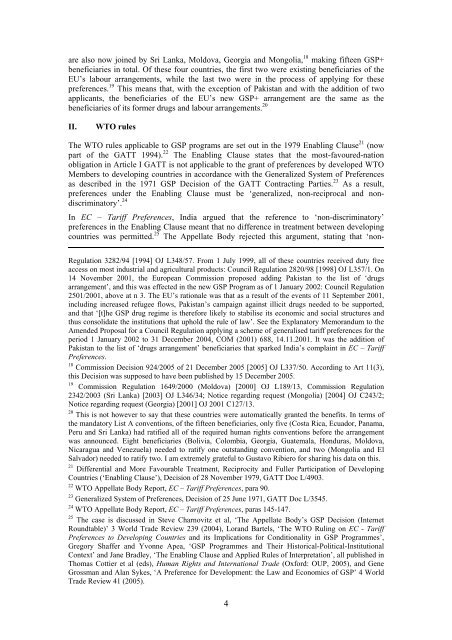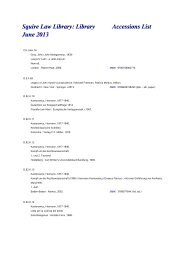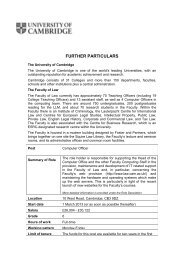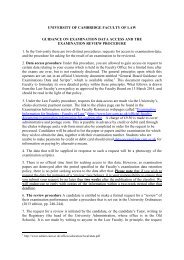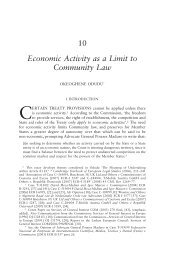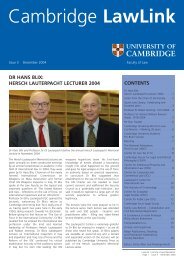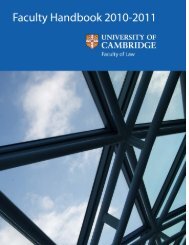The WTO legality of the EU's GSP+ arrangement Dr Lorand Bartels ...
The WTO legality of the EU's GSP+ arrangement Dr Lorand Bartels ...
The WTO legality of the EU's GSP+ arrangement Dr Lorand Bartels ...
You also want an ePaper? Increase the reach of your titles
YUMPU automatically turns print PDFs into web optimized ePapers that Google loves.
are also now joined by Sri Lanka, Moldova, Georgia and Mongolia, 18 making fifteen <strong>GSP+</strong>beneficiaries in total. Of <strong>the</strong>se four countries, <strong>the</strong> first two were existing beneficiaries <strong>of</strong> <strong>the</strong>EU’s labour <strong>arrangement</strong>s, while <strong>the</strong> last two were in <strong>the</strong> process <strong>of</strong> applying for <strong>the</strong>sepreferences. 19 This means that, with <strong>the</strong> exception <strong>of</strong> Pakistan and with <strong>the</strong> addition <strong>of</strong> twoapplicants, <strong>the</strong> beneficiaries <strong>of</strong> <strong>the</strong> EU’s new <strong>GSP+</strong> <strong>arrangement</strong> are <strong>the</strong> same as <strong>the</strong>beneficiaries <strong>of</strong> its former drugs and labour <strong>arrangement</strong>s. 20II.<strong>WTO</strong> rules<strong>The</strong> <strong>WTO</strong> rules applicable to GSP programs are set out in <strong>the</strong> 1979 Enabling Clause 21 (nowpart <strong>of</strong> <strong>the</strong> GATT 1994). 22 <strong>The</strong> Enabling Clause states that <strong>the</strong> most-favoured-nationobligation in Article I GATT is not applicable to <strong>the</strong> grant <strong>of</strong> preferences by developed <strong>WTO</strong>Members to developing countries in accordance with <strong>the</strong> Generalized System <strong>of</strong> Preferencesas described in <strong>the</strong> 1971 GSP Decision <strong>of</strong> <strong>the</strong> GATT Contracting Parties. 23 As a result,preferences under <strong>the</strong> Enabling Clause must be ‘generalized, non-reciprocal and nondiscriminatory’.24In EC – Tariff Preferences, India argued that <strong>the</strong> reference to ‘non-discriminatory’preferences in <strong>the</strong> Enabling Clause meant that no difference in treatment between developingcountries was permitted. 25 <strong>The</strong> Appellate Body rejected this argument, stating that ‘non-Regulation 3282/94 [1994] OJ L348/57. From 1 July 1999, all <strong>of</strong> <strong>the</strong>se countries received duty freeaccess on most industrial and agricultural products: Council Regulation 2820/98 [1998] OJ L357/1. On14 November 2001, <strong>the</strong> European Commission proposed adding Pakistan to <strong>the</strong> list <strong>of</strong> ‘drugs<strong>arrangement</strong>’, and this was effected in <strong>the</strong> new GSP Program as <strong>of</strong> 1 January 2002: Council Regulation2501/2001, above at n 3. <strong>The</strong> EU’s rationale was that as a result <strong>of</strong> <strong>the</strong> events <strong>of</strong> 11 September 2001,including increased refugee flows, Pakistan’s campaign against illicit drugs needed to be supported,and that ‘[t]he GSP drug regime is <strong>the</strong>refore likely to stabilise its economic and social structures andthus consolidate <strong>the</strong> institutions that uphold <strong>the</strong> rule <strong>of</strong> law’. See <strong>the</strong> Explanatory Memorandum to <strong>the</strong>Amended Proposal for a Council Regulation applying a scheme <strong>of</strong> generalised tariff preferences for <strong>the</strong>period 1 January 2002 to 31 December 2004, COM (2001) 688, 14.11.2001. It was <strong>the</strong> addition <strong>of</strong>Pakistan to <strong>the</strong> list <strong>of</strong> ‘drugs <strong>arrangement</strong>’ beneficiaries that sparked India’s complaint in EC – TariffPreferences.18 Commission Decision 924/2005 <strong>of</strong> 21 December 2005 [2005] OJ L337/50. According to Art 11(3),this Decision was supposed to have been published by 15 December 2005.19Commission Regulation 1649/2000 (Moldova) [2000] OJ L189/13, Commission Regulation2342/2003 (Sri Lanka) [2003] OJ L346/34; Notice regarding request (Mongolia) [2004] OJ C243/2;Notice regarding request (Georgia) [2001] OJ 2001 C127/13.20 This is not however to say that <strong>the</strong>se countries were automatically granted <strong>the</strong> benefits. In terms <strong>of</strong><strong>the</strong> mandatory List A conventions, <strong>of</strong> <strong>the</strong> fifteen beneficiaries, only five (Costa Rica, Ecuador, Panama,Peru and Sri Lanka) had ratified all <strong>of</strong> <strong>the</strong> required human rights conventions before <strong>the</strong> <strong>arrangement</strong>was announced. Eight beneficiaries (Bolivia, Colombia, Georgia, Guatemala, Honduras, Moldova,Nicaragua and Venezuela) needed to ratify one outstanding convention, and two (Mongolia and ElSalvador) needed to ratify two. I am extremely grateful to Gustavo Ribiero for sharing his data on this.21 Differential and More Favourable Treatment, Reciprocity and Fuller Participation <strong>of</strong> DevelopingCountries (‘Enabling Clause’), Decision <strong>of</strong> 28 November 1979, GATT Doc L/4903.22 <strong>WTO</strong> Appellate Body Report, EC – Tariff Preferences, para 90.23 Generalized System <strong>of</strong> Preferences, Decision <strong>of</strong> 25 June 1971, GATT Doc L/3545.24 <strong>WTO</strong> Appellate Body Report, EC – Tariff Preferences, paras 145-147.25 <strong>The</strong> case is discussed in Steve Charnovitz et al, ‘<strong>The</strong> Appellate Body’s GSP Decision (InternetRoundtable)’ 3 World Trade Review 239 (2004), <strong>Lorand</strong> <strong>Bartels</strong>, ‘<strong>The</strong> <strong>WTO</strong> Ruling on EC - TariffPreferences to Developing Countries and its Implications for Conditionality in GSP Programmes’,Gregory Shaffer and Yvonne Apea, ‘GSP Programmes and <strong>The</strong>ir Historical-Political-InstitutionalContext’ and Jane Bradley, ‘<strong>The</strong> Enabling Clause and Applied Rules <strong>of</strong> Interpretation’, all published inThomas Cottier et al (eds), Human Rights and International Trade (Oxford: OUP, 2005), and GeneGrossman and Alan Sykes, ‘A Preference for Development: <strong>the</strong> Law and Economics <strong>of</strong> GSP’ 4 WorldTrade Review 41 (2005).4


